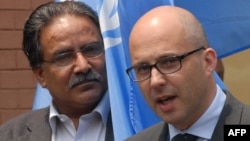A senior U.N. official said violence and conflict in northeastern Nigeria is threatening security in the Sahel region.
In an exclusive interview with VOA, Robert Piper, the United Nations' regional humanitarian coordinator for the Sahel, said the U.N. is scrambling to raise money to respond to the "protection crisis" triggered by the militant group Boko Haram, without diverting funds from other humanitarian needs.
Boko Haram's onslaught of violence over the past five years, in trying to create its own Islamic caliphate, has killed thousands of people and driven more than 1 million from their homes. Piper said the situation in northeast Nigeria is unraveling rapidly.
“It is the issue that keeps me awake most at night in my current role. Well over 1 million people are displaced inside Nigeria, but [there are] also hundreds of thousands of people who have now crossed the Nigerian border into neighboring countries," he said.
'Protection crisis'
"And they are moving into some of the poorest communities in the world. ... There is a massive protection crisis unfolding before us in Nigeria. We are scaling up all of our resources, our operations -- not only in northeast Nigeria, but in Chad, Cameroon and Niger -- to respond to this massive crisis," Piper said.
The United Nations recently launched a $2 billion appeal to provide humanitarian assistance in 2015 for millions of people in nine countries across Africa’s Sahel region. The amount of money requested is similar to that of last year.
However, $250 million, which last year was spent on food assistance for millions of acutely malnourished children and for other chronic emergencies, will be used this year to assist the burgeoning displaced population in the region.
In 2014, 1.6 million Nigerians were reported as refugees or internally displaced, Piper said, calling it a disturbing trend.
“This year, we start the year with over 3 million people internally displaced or refugees, either because of northern Mali, the spiraling situation in northeast Nigeria or, indeed, from Central African Republic or Darfur, which are themselves not part of the Sahel, but are sending refugees into the Sahel seeking sanctuary," he said.
Piper told VOA the pressure on receiving countries is enormous.
For example, he noted Niger, which is the poorest country in the world, is now hosting well over 100,000 refugees from northeast Nigeria. He said the picture is similar in Cameroon, which is hosting 60,000 refugees and more than 100,000 internally displaced people.
Progress threatened
Piper said this displacement surge is threatening progress in countries such as Niger, which is establishing safety nets, food security and nutrition programs. But, he said these and other policy changes will take time to show results.
“Meanwhile, around Niger’s borders, we have the crisis in Libya to [Niger's] north, the crisis in northern Mali to its west, the crisis in northeast Nigeria to its south. This is a pretty difficult neighborhood for a government to operate in. They are inevitably moving money from their social accounts into their security accounts. We can hardly blame them for that," the U.N. coordinator said.
Piper said the United Nations is watching this process with great anxiety. He said there is great uncertainty, in this climate of insecurity, whether the efforts Niger and other countries in the Sahel are making to improve the lot of their people will pay off.




